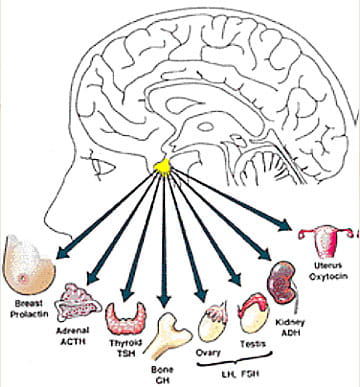Pituitary Adenoma Pregnancy Symptoms
During a normal pregnancy the production of estrogen increases.
Pituitary adenoma pregnancy symptoms. Patients with pituitary tumors who become pregnant may present with symptoms that suggest pituitary enlargement such as headaches nausea or visual disturbances. If you are pregnant and have a large prolactinoma these high levels of estrogen may cause tumor growth and associated signs and symptoms such as headaches and changes in vision. During pregnancy pattern of pituitary blood flow changes such that it derives more blood from systemic circulation and less from hypothalamic pituitary portal system. Does this patient with a pituitary adenoma wish to get pregnant.
Large pituitary tumors those measuring about 1 centimeter slightly less than a half inch or larger are known as macroadenomas. However the physical signs that are typically present with large pituitary tumors such as bitemporal hemianopsia diplopia or often signs of iii. A pituitary adenoma is a growth or tumor on the pituitary. A pituitary adenoma can also release high levels of hormones that affect how other organs and tissues work.
What are the signs and symptoms of a pituitary adenoma. The signs and symptoms of pituitary tumors that don t make hormones nonfunctioning are related to their growth and the pressure they put on other structures. Luckily an adenoma that causes health problems is far rarer with approximately one pituitary adenoma per thousand causing symptoms. Anatomic changes in the pituitary in normal pregnancy magnetic resonance imaging mri scans performed during pregnancy demonstrate a gradual increase in maternal pituitary volume over the course of gestation with an increased final weight 660 760 mg as well as a volume increase of 30 above the pregestational volume.
Most pituitary adenomas are slow growing and benign which means they are not cancer and do not spread to other parts of the body. However as they grow big they can put pressure on nearby structures such as the nerves that connect the eyes to the brain and cause symptoms. Functional adenomas can cause problems because of the hormones they release. Lateral expansion of a pituitary adenoma can also compress the abducens nerve causing a lateral rectus palsy.
Prolactinomas often start to give symptoms especially during pregnancy when the hormone progesterone increases the tumor s growth rate. But when they do they can cause many different types of symptoms. Also a pituitary adenoma can cause symptoms of increased intracranial pressure. A pituitary adenoma can put pressure on nearby nerves and brain tissue.
Your signs and symptoms will depend on the size of the tumor and the hormones released. Pituitary adenomas are extremely common with as many as one in six patients having a small adenoma present in the pituitary gland at some point in their life. Not all pituitary tumors called pituitary adenomas cause symptoms.

